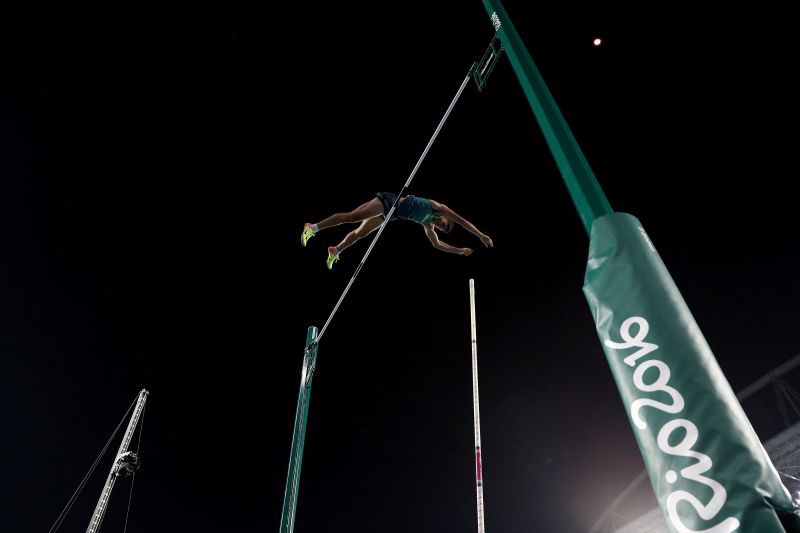
Thiago Braz, Olympic Gold Medalist, Receives 16-Month Doping Ban

Thiago Braz, the Brazilian Olympic gold medalist in pole vaulting, will be absent from the upcoming Paris Games following a 16-month suspension for doping violation.
Brazilian Olympic gold medalist pole vaulter Thiago Braz will not be competing in the upcoming Games in Paris. He received a 16-month doping suspension after testing positive for ostarine glucuronide during an in-competition test on July 2 last year. The Athletics Integrity Unit (AIU), an independent body that fights against doping, made the announcement on Tuesday. Thiago Braz had won gold in front of his home crowd at the 2016 Rio Olympics.
Ostarine is classified as an anabolic agent on the World Anti-Doping Agency's 2023 list of banned substances. It is commonly used to boost muscle growth and improve athletic performance, as stated by the AIU.
The AIU reported that Braz's defense was based on the claim that he was unaware of consuming ostarine. He explained that he unknowingly took it through a supplement provided by a sports nutritionist for health purposes.
The ban is in place until November 27, 2024. Braz has appealed to the Court of Arbitration for Sport (CAS) in the hopes of being able to participate in the Olympics later this year.
According to a spokesperson for Braz, the 16-month ban is seen as a favorable outcome. This is especially notable considering that the Athletics Integrity Unit (AIU) had originally pushed for a four-year ban.
Thiago's defense has appealed to the Court of Arbitration for Sport in Switzerland. They believe that the 16-month suspension is too harsh considering the athlete's low level of responsibility. The spokesperson is confident that the sanction will be overturned or the period of ineligibility will be shortened.
Braz, a two-time Olympic medalist, had been hopeful of competing in Paris this year.
Braz, a two-time Olympic medalist, had been hopeful of competing in Paris this year.
Paul Gilham/Getty Images/File
The disciplinary tribunal mentioned that Braz was suspended on July 28 last year due to taking supplements that could be contaminated with prohibited substances. He was warned about this risk but chose to ignore it.
The panel majority concluded that although Braz should have been more careful in trusting his medical team, he ultimately did not act with significant fault or negligence.
In a press release, AIU head Brett Clothier mentioned that athletes from Brazil, like Mr. Braz, have been educated about the risks of using supplements from compound pharmacies in Brazil. This education took place through AIU online forums and athlete advisory notices. Despite these warnings, it is disheartening to see a case like this.
In the same press release, the AIU mentioned that they are thinking about appealing the 16-month ban.
Thiago Braz's lawyer, Marcelo Franklin, stated, "After two days of hearings in London, the athlete's defense arguments were successful, showing that Thiago Braz was a victim of supplement contamination (an unintentional violation with no significant fault)."
Braz achieved Olympic gold in Rio by defeating Renaud Lavillenie from France in a close competition. Lavillenie was the world record holder in pole vault at that time.
He made history as the sixth Brazilian to secure an athletics gold medal at the Olympics. Additionally, he added to his success by winning a bronze medal in Tokyo five years later.
Editor's P/S:
The doping scandal involving Brazilian Olympic gold medalist Thiago Braz is a disheartening reminder of the challenges faced in the fight against performance-enhancing substances in sports. It is particularly concerning that Braz tested positive for ostarine, a substance known for its muscle-building and performance-boosting effects. The fact that Braz claims to have unknowingly consumed ostarine through a supplement highlights the potential dangers of trusting third-party products for athletic enhancement.
The 16-month suspension handed down to Braz is a significant punishment, but it is important to note that the Athletics Integrity Unit (AIU) had initially sought a four-year ban. This suggests that the AIU may have taken into account Braz's claims of unintentional consumption and lack of significant fault or negligence. However, the AIU's consideration of appealing the ban indicates that the fight against doping in sports remains a complex and ongoing battle. It is crucial for athletes to be vigilant in their use of supplements and to work closely with trusted medical professionals to avoid the risk of unknowingly consuming banned substances.







